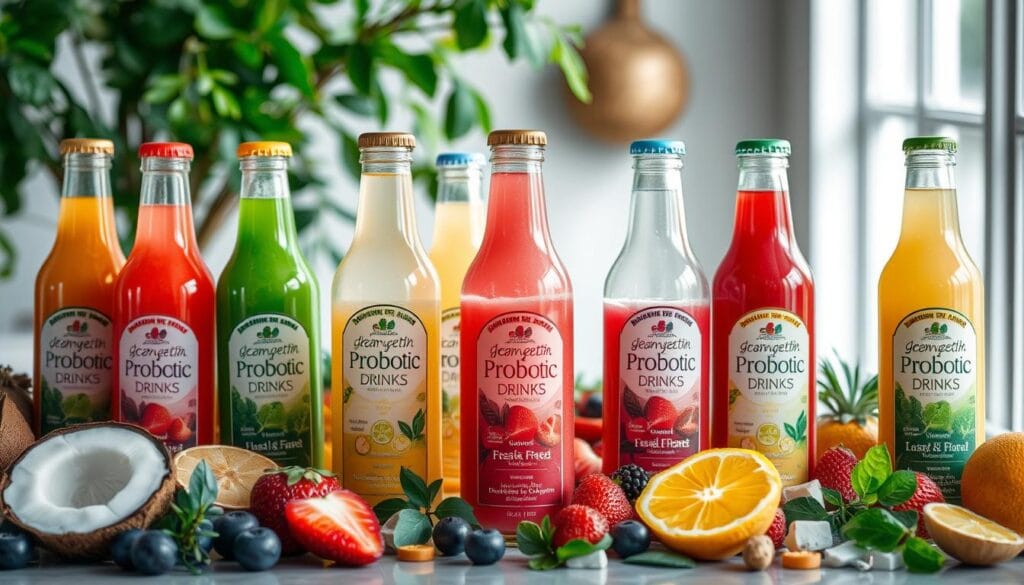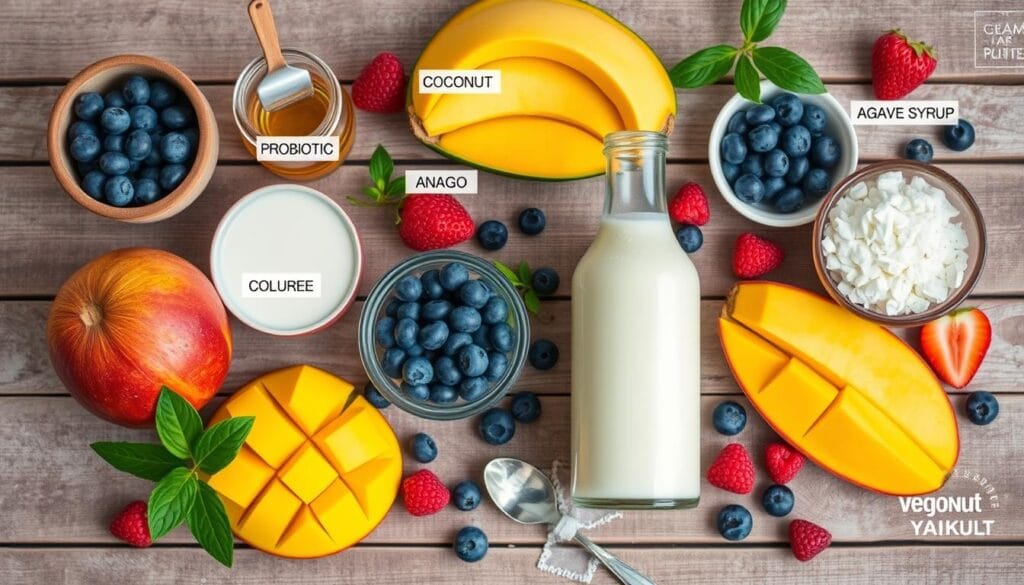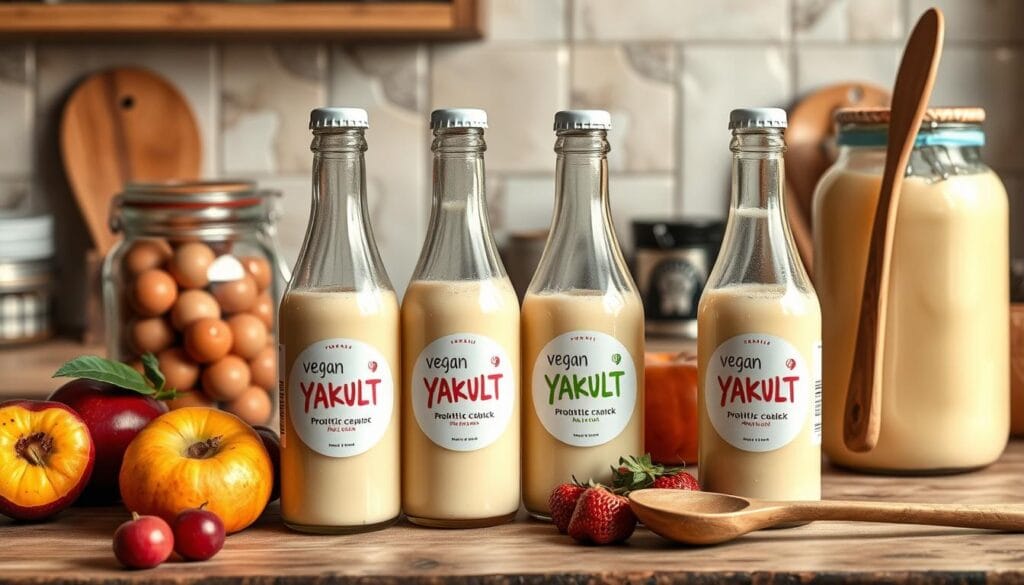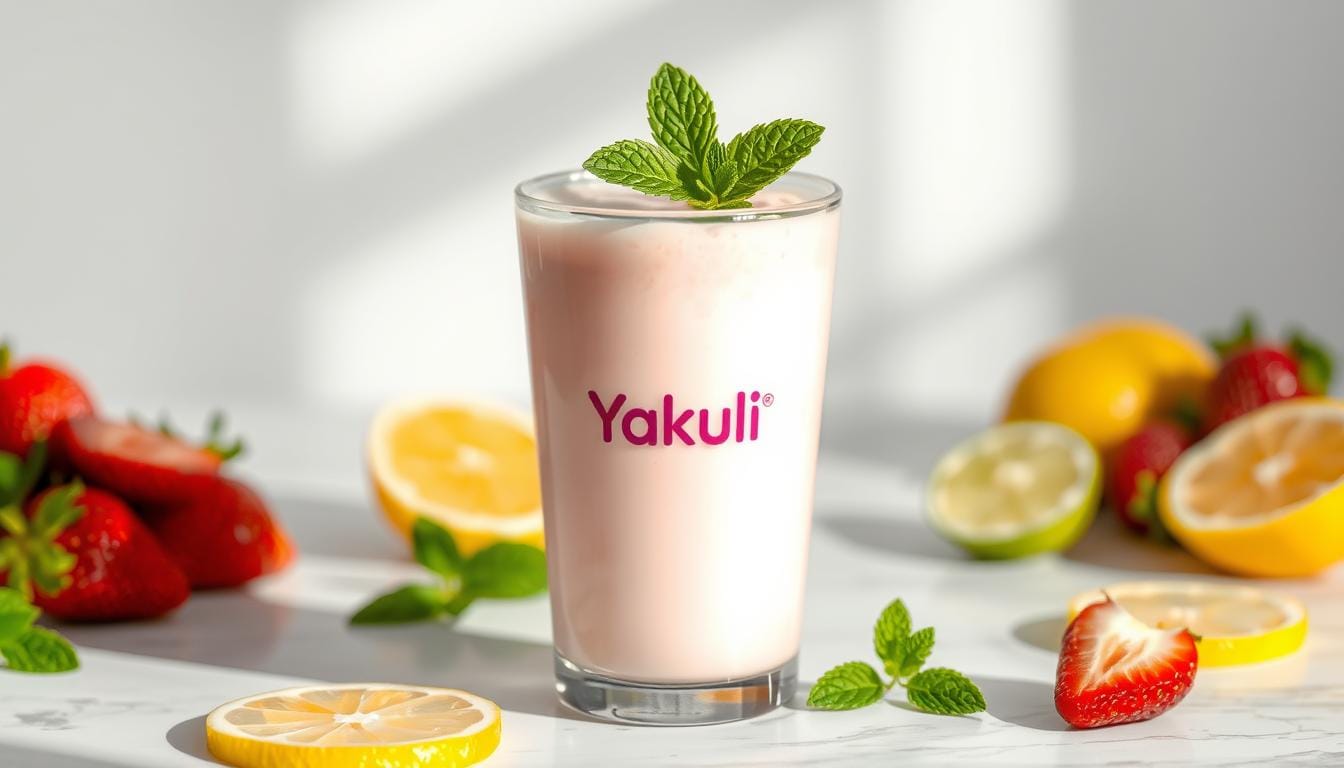I love exploring new flavors and health benefits, especially with Yakult. But, as a vegan, I’ve always wanted a dairy-free version. Now, I’m excited to share a Yakult recipe vegan that’s both tasty and good for you.
Table of Contents
Today, more people care about their health and the planet. They’re looking for probiotic drinks and vegan kefir options. Yakult, a Japanese fermented milk drink, is known for its health benefits. But, what if you could have those benefits without dairy? That’s where dairy-free Yakult comes in, offering a refreshing and healthy choice.
- Discover a delicious vegan version of the iconic Yakult probiotic drink.
- Explore the rich history and health benefits of traditional Yakult, and learn why vegan alternatives are on the rise.
- Get step-by-step instructions for crafting a refreshing Calamansi Yakult Slushie at home.
- Uncover creative flavor combinations and customization options to make your vegan Yakult truly your own.
- Learn expert tips for achieving the perfect consistency and taste every time.
Understanding Traditional Yakult and the Need for Vegan Alternatives
Probiotic drinks like Yakult are getting more popular. They offer many choices for those wanting to improve their gut health. Yakult, a fermented milk drink, has been loved in Japan for over a century. It is renowned for its distinct flavor and numerous health benefits.
History of Yakult as a Probiotic Beverage
Yakult was introduced in 1935 by Minoru Shirota, a Japanese microbiologist. He found the Lactobacillus casei Shirota strain to be beneficial. This strain is what makes Yakult special, making it a top choice in the probiotic market.
Yakult’s fame has grown worldwide. It’s now a favorite in many countries.
Why Choose Vegan Yakult Options
More people want plant-based and ethical food and drinks. Vegan Yakult alternatives are needed for those with dietary restrictions. This includes those who are lactose intolerant or vegan.
Some choose vegan Yakult for the environment. Plant-based products often have less impact on the planet than dairy-based ones.
Health Benefits of Probiotic Drinks
Probiotic drinks, like Yakult, have live beneficial bacteria. These bacteria, such as Lactobacillus and Bifidobacterium, help balance gut flora. This can improve digestion, reduce bloating, and boost the immune system.
Drinking probiotic drinks regularly can improve overall health. It helps with nutrient absorption, managing digestive issues, and may even support mental health.

| Probiotic Strain | Health Benefits | Beverage Examples |
|---|---|---|
| Lactobacillus | Improved digestion, reduced bloating, enhanced immunity | Yakult, Kefir, Kombucha |
| Bifidobacterium | Gut health, nutrient absorption, potential mental health support | Yakult, Activia, Actimel |
| Streptococcus thermophilus | Lactose digestion, anti-inflammatory properties | Yogurt, Kefir |
The interest in gut health is growing. This means more people will look for vegan probiotic drinks like homemade yakult. They’ll want yakult recipe vegan options to add probiotics to their plant-based diets.
Essential Ingredients for Yakult Recipe Vegan
Making a tasty vegan yakult at home needs the right ingredients. You’ll need plant-based milk, probiotic supplements, and natural sweeteners. These help get the perfect mix of probiotics, sweetness, and creaminess.
The base of your vegan yakult is a good non-dairy milk. You can use unsweetened almond milk, coconut milk, or oat milk. These milks are dairy-free and add unique flavors.
To add probiotics, use a vegan kefir starter or probiotic supplement. Look for one with Lactobacillus paracasei, found in traditional yakult. This turns your milk into a tangy, healthy drink.
For sweetness, try maple syrup, agave nectar, or coconut sugar. Start with a little and adjust to taste. This ensures the sweetness fits the flavor well.
Adding Sanzo sparkling water can make your vegan yakult even better. It adds fizz and a hint of citrus, making it refreshing and fun to drink.
| Ingredient | Purpose |
|---|---|
| Plant-based milk (almond, coconut, oat) | Provides the base for fermentation |
| Vegan probiotic culture or kefir starter | Introduces beneficial bacteria for fermentation |
| Natural sweeteners (maple syrup, agave, coconut sugar) | Balances the tartness of the probiotics |
| Sanzo sparkling water | Adds effervescence and citrus notes |
With these ingredients, you can make a delicious vegan yakult at home. Enjoy the mix of probiotics, sweetness, and refreshing flavors. It’s great for both your taste buds and your health.

Equipment and Preparation Tips for Homemade Vegan Yakult
Making your own vegan probiotic drink like vegan Yakult is easy. You just need a few kitchen tools and simple steps. Knowing what you need and following safety tips will help you enjoy your homemade homemade yakult.
Required Kitchen Tools
- A high-powered blender or food processor to ensure the ingredients are blended smoothly.
- A large glass jar or airtight container for fermentation
- A mesh strainer to separate the fermented Yakult from any sediment
- A whisk or spoon for stirring the mixture during fermentation
Sterilization and Safety Measures
Keeping your kitchen clean is key when making vegan probiotic drink at home. Wash and sterilize all tools with hot water and soap. Make sure your work area is clean before starting.
Storage Guidelines
Once your homemade yakult is fermented, store it right. Store it in airtight containers and refrigerate. Your vegan Yakult will last 10 to 14 days. But it’s best to drink it within a week for the best taste and health benefits.

By using the right tools and following these steps, you’ll make a great vegan probiotic drink. Enjoy the tasty and healthy benefits of your own vegan Yakult!
Step-by-Step Guide to Making Calamansi Yakult Slushie
Make your vegan lifestyle more exciting with a Calamansi Yakult Slushie! This frozen treat mixes the zing of calamansi with Yakult’s health benefits. It’s perfect for a cool treat or a healthier slushie option.
First, get your ingredients ready: Sanzo sparkling calamansi water, vegan Yakult, and crushed ice. The secret is balancing calamansi’s tartness with Yakult’s probiotics. Start by mixing ½ cup of Sanzo sparkling calamansi water and ½ cup of vegan Yakult in a blender.
- Add 1 cup of crushed ice and blend until smooth and slushy.
- Freeze some Yakult in ice cube trays for a creamier slushie.
- Blending might create foam. Just skim it off for a smoother slushie.
Enjoy your Calamansi Yakult Slushie right away in your favorite glass. Garnish with a sprig of mint or a slice of calamansi for an extra burst of flavor. It’s great for hot days, cozy afternoons, or any time you want a treat.
Try your yakult recipe vegan Calamansi Yakult Slushie and post it on Instagram with #rezelkealoha. The mix of asian fruit tea recipe and yakult boba will take you to a tropical paradise, sip by sip.
Creative Variations and Flavor Combinations
There’s more to vegan Yakult than the basic recipe. Discover a world of exciting flavors and new mixes that will make your taste buds happy. You can try everything from fizzy drinks to fruit-infused drinks, all packed with probiotics.
Sparkling Vegan Yakult Blends
Make your Yakult bubbly by mixing it with sweetened soda or carbonated water. Try green yakult or yakult soda for a twist on the classic.
Seasonal Fruit Additions
Use fresh fruits to make your Yakult even better. Imagine a Yakult with mangoes or a lemon slushy. The choices are endless when you let your imagination run wild.
Boba and Topping Options
Top your Yakult for a cool photo. Add boba for a fun texture, or try fruit puree or coconut flakes. Mix and match to create your dream drink.
Get creative with your vegan Yakult to make it a fun and tasty treat. Try fizzy drinks or fruit mixes to make it your own. Start experimenting and find your new favorite drink.
Tips for Perfect Consistency and Taste
Making the perfect vegan Yakult needs focus on both texture and taste. To get the right texture, pay attention to the fermentation temperature and time. Keep the incubation temperature between 100-110°F (38-43°C) for best results. Fermentation usually takes 1 to 2 days, with 36-48 hours being the sweet spot for a thick, tangy drink.
Getting the sweetness just right is also key. Start with a little sweetener like maple syrup or agave nectar. Then, add more to taste. The Yakult should be refreshing and slightly tart, not too sweet.
If your Yakult is too watery, use cheesecloth or a nut milk bag to drain excess liquid. This will thicken it without losing flavor. If it’s too thick, add a bit more non-dairy milk or water to thin it out.
| Common Yakult Texture Issues | Suggested Fixes |
|---|---|
| Thin Consistency | Drain excess liquid using cheesecloth or nut milk bag |
| Too Thick Consistency | Add more non-dairy milk or water to thin it out |
Remember, each batch of vegan probiotic drink might need slight tweaks to get it just right. Feel free to try different variations and refine your recipe with each attempt. This way, you’ll get better at making your yakult recipe vegan over time.
“The key to a delicious and creamy vegan Yakult is finding the right balance of flavors and textures. With a little trial and error, you’ll be sipping on the perfect probiotic drink in no time.”
Conclusion
Follow this guide to make your own tasty vegan yakult recipe at home. This vegan probiotic drink is great for your gut health. You can try different flavors and add-ins.
Adding dairy-free yakult to your diet has many benefits. It boosts your immune system and helps with digestion. You can make it as a slushie or a creamy drink, depending on what you like.
Keep trying new things with homemade probiotic drinks. Share your vegan yakult with others. It’s fun to make and enjoy. Be creative and enjoy the health benefits of this dairy-free treat.

